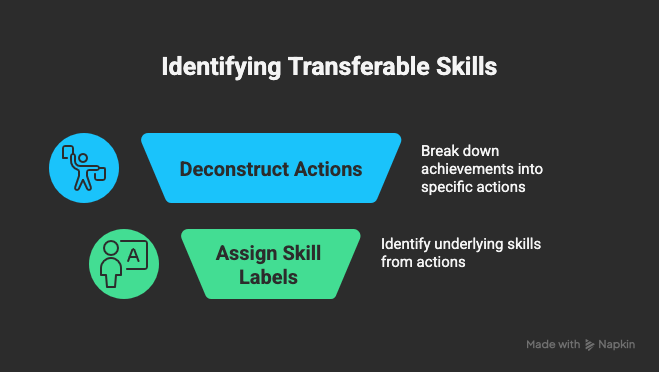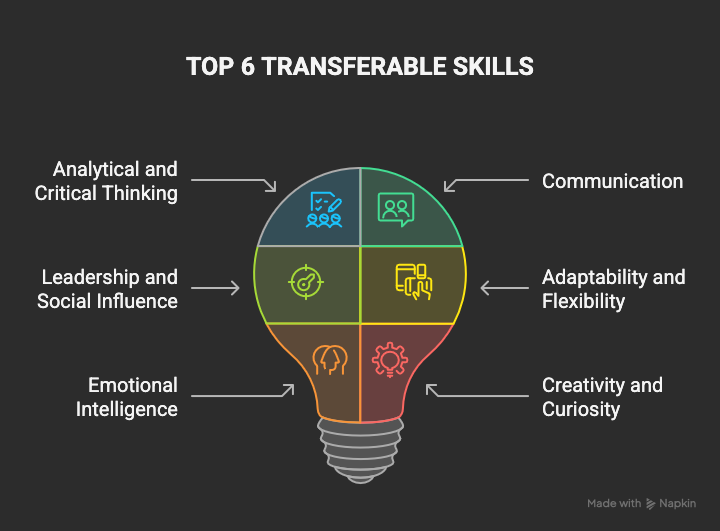How can professionals identify and showcase transferable skills effectively in 2025?
Reflect on past achievements to uncover core skills like communication, problem-solving, and adaptability. Label them clearly, embed proof in your resume bullets, and illustrate them through real examples in interviews.
Job descriptions change. Industries pivot. But the core skills that make you a valuable professional? Those are timeless.
These are your transferable skills - the strengths and habits you carry from one role to the next, proving your adaptability and impact wherever you go.
They go beyond job-specific tools or titles and reflect how you think, communicate, and solve problems.
Let’s unpack why they matter more than ever, and how you can identify and showcase yours effectively.
Why Should You Care About These Skills More Than Ever?
The idea of a "job for life" is long gone. The average person now holds roughly 12 jobs in their lifetime, according to the U.S. Bureau of Labor Statistics.
This reality means your career is no longer a straight ladder but a series of pivots and changes, and your transferable skills are the toolkit that makes these transitions successful.
Furthermore, the world of work is changing at an unprecedented pace.
The World Economic Forum's Future of Jobs Report highlights that 44% of a worker's core skills are expected to be disrupted in the next five years.
As technology automates routine tasks, uniquely human skills like creativity and emotional intelligence become your greatest professional assets.
How Can You Identify Your Own Transferable Skills?
You have more transferable skills than you think. The key is to look beyond your job duties and focus on your accomplishments.
Use this simple three-step process to uncover them:
- List Your Top 5-7 Achievements: Think about moments you were most proud of at work, in a volunteer role, or even in a personal project. What problems did you solve? What did you build, improve, or lead?
- Deconstruct the "How": For each achievement, write down the specific actions you took. Don't just say "managed a project." Instead, write "coordinated with three departments to deliver the project two weeks ahead of schedule, resolving two major roadblocks along the way."
- Assign Skill Labels: Now, label those actions with the underlying skill. "Coordinated with three departments" is collaboration. "Delivering ahead of schedule" is time management and efficiency. "Resolving roadblocks" is problem-solving.

What Are the Top 6 Transferable Skills Employers Are Hiring For?
While there are dozens of valuable skills, the following 6 consistently appear in workplace and hiring reports as the most critical for success in the modern economy.
- Analytical and Critical Thinking: The ability to assess information, identify logical connections, and solve complex problems. According to the World Economic Forum, analytical thinking is considered a core skill by the highest number of companies surveyed for its 2023 report.
- Communication: This isn't just about being a good talker. It's about clarity in writing, active listening, and the ability to persuade and convey complex ideas simply. A Lumi study revealed that 86% of employees and executives cite a lack of effective collaboration and communication as the main cause of workplace failures.
- Leadership and Social Influence: You don't need a manager title to be a leader. This is about taking initiative, motivating others, and guiding teams toward a common goal. LinkedIn's 2024 Most In-Demand Skills report lists leadership as a top skill, as it's crucial for driving change and fostering a positive work environment.
- Adaptability and Flexibility: Your ability to thrive in a constantly changing environment. This skill is about embracing new tools, adjusting to shifting priorities, and maintaining a positive attitude in the face of uncertainty. It is one of the most sought-after behavioral skills by employers.
- Emotional Intelligence (EQ): The capacity to be aware of, control, and express one's emotions, and to handle interpersonal relationships judiciously and empathetically. Research consistently shows that high EQ is a strong predictor of job performance, with some studies suggesting it's responsible for 58% of success in all types of jobs.
- Creativity and Curiosity: In an age of AI, the ability to think outside the box, ask "what if?", and generate novel ideas is invaluable. The same WEF report places creative thinking right behind analytical thinking as a skill of growing importance for workers in the coming years.

How Do You Effectively Showcase These Skills on a Resume?
Your resume shouldn't just list skills; it must provide evidence of them. The best way to do this is by embedding them into your work experience bullet points.
Use action verbs and quantify your results to show, not just tell. For example:
Before:
- Responsible for managing the team's social media accounts.
After:
- Led a team of 3 to develop and execute a new content strategy, increasing social media engagement by 45% in 6 months by analyzing performance data to identify audience preferences (Leadership, Analytical Skills, Communication).
Notice how the "After" version uses powerful resume action words and provides concrete proof of multiple transferable skills.
How Should You Discuss Transferable Skills in an Interview?
Interviews are your opportunity to bring your skills to life through storytelling.
Prepare specific examples from your past that demonstrate your top transferable skills in action. Structure your answers using the STAR method (Situation, Task, Action, Result) to make them clear and compelling.
Interviewer: "Tell me about a time you had to solve a difficult problem."
Your Answer (demonstrating Problem-Solving and Initiative):
- (Situation) "In my previous role, our team's productivity was down 15% because our workflow software was inefficient and causing delays."
- (Task) "My goal was to identify the key bottlenecks and propose a solution to improve our team's efficiency without a budget for new software."
- (Action) "I spent a week interviewing each team member to understand their pain points. Using that feedback, I discovered we could automate three of our most time-consuming manual tasks using features already built into the software. I created a short training guide and walked the team through the new process."
- (Result) "Within a month, we eliminated the delays, and team productivity increased by 20%. We also saw a noticeable improvement in team morale."
This structured answer provides undeniable proof of your skills, making it far more impactful than simply saying, "I'm a good problem-solver."
Wrapping Up
Transferable skills are the foundation of career growth. They help you adapt, stay relevant, and succeed - no matter how the world of work evolves.
The key is to identify them, refine them, and present them with clarity so employers see your full potential.
And if you’re ready to bring your strengths to life on your resume, cover letter, LinkedIn profile or in interviews, Hiration can help you showcase your transferable skills with confidence and precision - so every opportunity sees the value you bring.
Transferable Skills in 2025 — FAQ
What are transferable skills?
Transferable skills are versatile abilities like communication, problem-solving, and adaptability that apply across jobs and industries, showing your value beyond specific tools or titles.
Why are transferable skills so important in 2025?
As technology and industries evolve, transferable skills ensure long-term career resilience. The World Economic Forum reports that 44% of core skills will be disrupted in the next five years, making adaptability crucial.
How can I identify my own transferable skills?
Reflect on your top achievements, break down how you accomplished them, and label the underlying skills such as teamwork, leadership, or analytical thinking that made those successes possible.
What are the top transferable skills employers value most?
Employers prioritize analytical thinking, communication, leadership, adaptability, emotional intelligence, and creativity as essential skills for success in a changing job market.
How should I highlight transferable skills on a resume?
Embed skills into bullet points with measurable results. Use action verbs and data to prove impact, e.g., “Led a team of 3 to boost engagement by 45%,” showing leadership and analytical skills.
How do I demonstrate transferable skills during an interview?
Use the STAR method—describe the Situation, Task, Action, and Result—to share stories that prove your skills in real-world scenarios, emphasizing adaptability and results.
Can transferable skills help with career changes?
Yes. Transferable skills bridge gaps between roles or industries, showing employers your ability to adapt and deliver value even without direct experience in their field.
How can I keep my transferable skills relevant?
Continuously update your skill set through learning, practice, and feedback. Focus on communication, emotional intelligence, and creative problem-solving as technology reshapes work.
What’s the difference between hard and transferable skills?
Hard skills are job-specific, like coding or accounting. Transferable skills, such as leadership or critical thinking, apply universally across different roles and industries.
What’s the best way to talk about transferable skills with employers?
Link them directly to job outcomes. Explain how skills like collaboration or adaptability helped you meet goals or solve challenges, proving they’ll add value in the new role.



